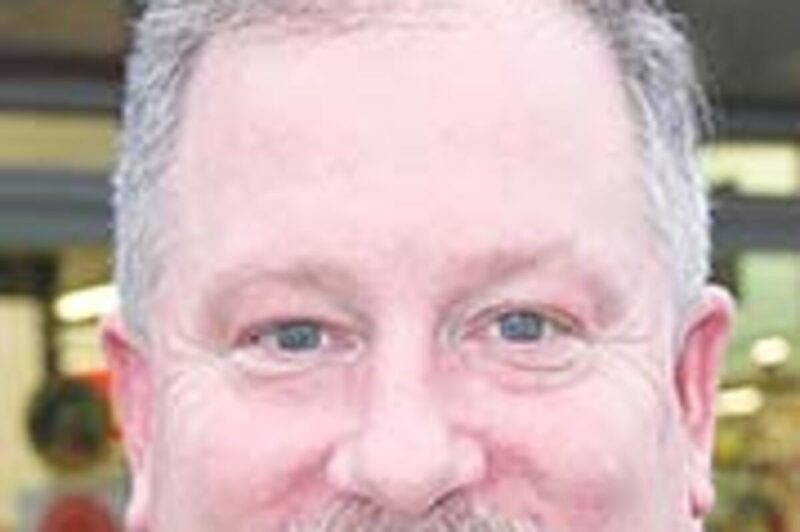Sean C. Morgan
Mayor Greg Mahler wants to see through some unfinished business with the City of Sweet Home.
Mahler, 55, is one of seven candidates seeking four positions on the City Council in the Nov. 6 general election. Also running are Larry Angland, Greg Korn and Cortney Nash along with incumbents Diane Gerson, Susan Coleman and Bob Briana.
Ballots were mailed Friday, and ballots are due by 8 p.m. on Nov. 6 at drop sites, including City Hall and the Sweet Home Police Department.
Mahler is the operations manager at his family’s business, Hoy’s Hardware. He has lived in Sweet Home since 1971 and graduated from Sweet Home High School in 1981. He attended Linn-Benton Community College and studied business.
He grew up with and has worked at the family business office during three different periods, his most recent beginning in 2006. In the early 1990s, he started a business setting up new stores, including Goodwill, Ace Hardware, True Value hardware, Fred Meyer and Wilco. The business employed up to 24 people. The company continues to operate with eight employees.
Mahler is married to Teresa Mahler, who manages the second family business. They have three adult children and four grandchildren.
Mahler has been a volunteer firefighter in Sweet Home for 31 years. He has served 12 years on the City Council, including a two-year period in the 1990s.
Most recently, the City Council appointed Mahler in January 2008 after the late Bob McIntire resigned due to health issues. He was re-elected to his seat twice since then, 2010 and 2014.
“It’s gone by real fast,” Mahler said. “I hope I have the opportunity to serve the people of Sweet Home again. I’ve looked after the best interests of this community. I hope I’m re-elected. I feel I still have unfinished business with the current council.”
The city is revamping the Wastewater Treatment Plant, he said, and he would like to see that further along.
Foremost are the city’s economic development efforts, he said. The city has a lot in the works now.
“Expect major changes for the positive in a few years,” Mahler said.
The city’s Commercial Exterior Improvement Plan is moving along, and the program committee has awarded grant funds to several projects, Mahler said. “It’s important that we do this. It gives a nice face lift to our (commercial areas).”
One of his top goals, he said, is to improve healthcare resources in Sweet Home. That includes an urgent care, memory care, senior living and physical therapy.
City officials have had conversations about those needs with Samaritan Health Services and others.
“We’ve got some behind-the-scenes we’re working on,” Mahler said. “Conversations are happening.”
He said he’s had discussions with a developer about building a new senior assisted living facility.
“There’s a need for senior services in a lot of areas,” Mahler said.
The Sweet Home Fire and Ambulance District is one of the largest fire districts in the state, Mahler said, and calls can be 30 to 40 miles to the east. He finds it hard to believe Sweet Home doesn’t have a stop to help stabilize and evaluate patients or a helipad to transfer patients to hospitals.
Other small towns near larger urban centers have hospitals, he said, including Junction City and Stayton.
He said he’ll continue to push for more healthcare services.
Parks are near the top of his priority list, behind only economic development, Mahler said. “I think our parks have made great strides.”
The city is working on plans for more than 200 acres of former quarry property along the South Santiam River.
The city continues to move forward with a huge list of plans for Sankey Park, Mahler said. Coming up are lighting improvements and new restrooms, play equipment, trails, picnic tables and more.
Improvements at Ashbrook Park are “really nice,” Mahler said, and the city will continue moving park to park making improvements.
The council has talked about it a lot in the past, Mahler said, and now it’s putting money to it.
Linn County transferred the property to the city, which is exploring some opportunities there, Mahler said.
Coming up, the city is going to have to grapple with homelessness and with high housing prices, Mahler said, noting that housing prices are probably leveling off and activity will dip as interest rates climb.
All of these projects are “only going to benefit your economic development,” Mahler said. “From there, you clean up your downtown, and you’ll have people say, ‘Hey, I want to live in this town.'”
In the past year, many Sweet Home residents have seen their trash, sewer and water bills and property taxes increase substantially. In addition to an annual increase to cover inflation, trash rates increased another 8 percent based on China’s decision to stop accepting recycling. Sewer rates increased to cover a shortfall in funding and an upcoming improvement project at the Wastewater Treatment Plant; and property tax bills are increasing rapidly – the mayor’s taxes, for example, increased by 15 percent from last year – as compression decreases.
“Obviously, the wastewater is the issue,” Mahler said. “You’ve got to stay in the black. You can’t go into the red.”
Over the years, while the economy was bad, the council tried to minimize increases, freezing rates a couple of times, he said. “We went in the red. You can’t operate in the red.”
Rather than larger increases at once, he thinks the council should enact smaller increases year to year to avoid large impacts on utility bills.
In the future, “I want to know the bare minimum to be in the black,” Mahler said. It’s the same in other areas.
“If we don’t do something in the next couple of years, the police are going to go into the red,” Mahler said, but he doesn’t want to see any layoffs or a need to move dispatch services.





